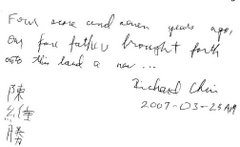We just came back from the 7th All California Ataxia Research Meeting (ACARM7) held at the San Jose Doubletree Hotel today. This year's meeting was almost canceled due to budget issues stemming from lower than expected attendance. At the eleventh hour, it was saved by a generous anonymous underwriter. The other unsung heroes are Mike Fernandes, the organizer of the venue, the doctors and presenters of the program and the numerous volunteers who helped to bring the event into fruition.
The first speaker of the morning was Dr. Richard Ivry who talked about "The Effect of Ataxia on Cognition". Specifically, he spoke about Dr. Jeremy Schmahmann's work on the "Cerebellar Cognitive Affective Syndrome". Dr. Ivry concluded that ataxics have difficulty with non-motor tasks but their cognitive problems might be secondary to their motor problems.
Dr. Susan Perlman was next. Her topic was "An Update of Clinical Trials for the SCAs and HD". According to Dr. Perlman, if one were to do a web search on the key words "clinical trials for Ataxia", one would find 42 trial listings of which only 35 actually dealt with Ataxia. 13 of these trials have been completed, 5 are active but no longer recruiting for subjects while the remaining 17 are still recruiting. Of these 17, one is available in California ---- Phase III Idebenone and Extension Study for FA. (Friedreich's Ataxia) Also, the pilot study of Lithium for patients with SCA1 has now started in Maryland and is still recruiting.
Dr. Lisa Ellerby followed Dr. Perlman with "Target Validation in HD: siRNA screens in HD cell culture models". After conducting studies to screen through possible druggable targets using siRNA technology, her team has found that HDAC4 inhibitors to be effective against Huntington's Disease.
Dr. Elizabeth Thomas was the last speaker of the morning. She further elaborated on the HDACs with "Novel Histone Deacetylase Inhibitors as Therapeutics for Triplet Repeat Disorders". While conventional HDAC inhibitors (used in treating cancers) are very toxic, novel HDAC inhibitors have been shown in (non-human) trials to be low in toxicity. Experiments on transgenic mice using HDACi4b have shown it to be therapeutic and non toxic for triplet repeat disorders such as HD, SCA1, 2 and 3. Repligen Corp. in Waltham, Massachusetts has licensed HDAC inhibitors in development.
The three presenters in the afternoon were Richard Devylder, (Emergency Disasters for the Disabled) Colleen Campbell (Falling Prevention) and Arya Pathria. (Laughing: Laughter Yoga Workshop)
Sunday, September 14, 2008
Subscribe to:
Comments (Atom)


